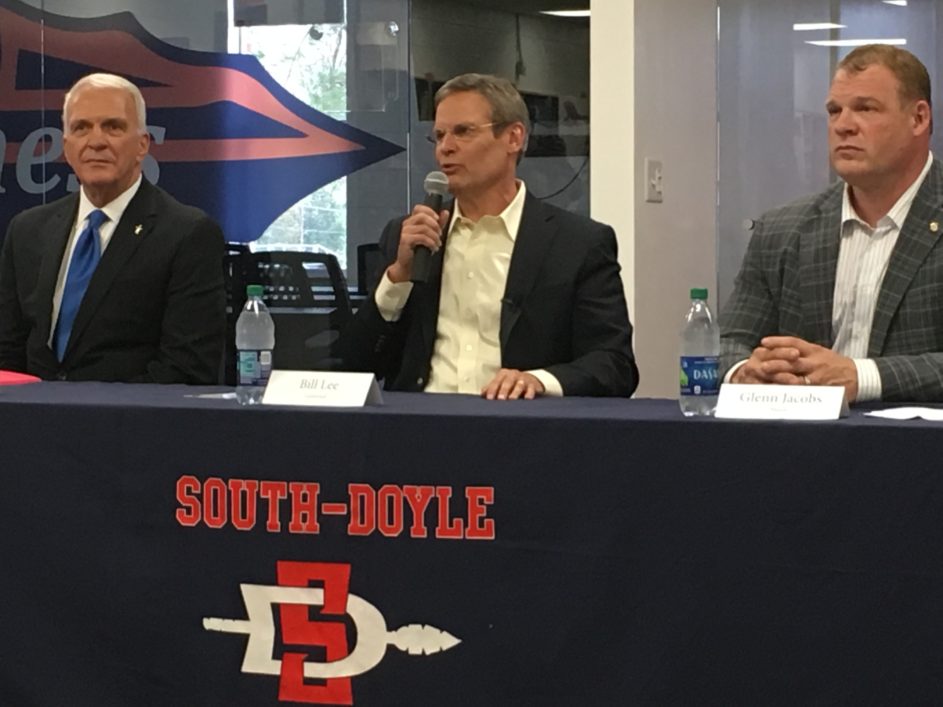Bill Lee’s first visit to Knox County as Tennessee’s governor brought him to South-Doyle High School, where an excited crowd of politicians, educators and business leaders greeted him and his message of emphasizing and expanding Career Technical Education throughout the state.
County Mayor Glenn Jacobs told the audience packed into the sleek and modern SDHS library on Friday that the governor’s visit “illustrates his deep commitment to expanding career and technical opportunities, especially for our young people. This will equip many more of our young folks with the skills and tools that they need to succeed. It’s also going to equip Tennessee with a workforce that can lead in a global economy.”
Lee started his afternoon at SDHS with a tour of the school’s career-oriented classes and later told his listeners, “This high school is an unusual one in that it has such a developed program. But we have for decades slowly but surely diminished our educational system, diminished the approach to vocational, technical and ag, and we need to turn that around. We do need high schools to look different all across Tennessee, and I believe that they will.”

South-Doyle culinary students created and served craft beverages for Lee and his audience. They also baked chocolate chip cookies for the event.
SDHS principal Tim Berry said that while his school does have strong CTE programming, “We want more. Until every need is met for every kid and every interest, we’re not done.”
Lee has made his career in HVAC for 35 years “and employed hundreds of men and women. Many of them were skilled-trades people: welders, plumbers, pipefitters, electricians. Many of them did not have a college degree but had very good careers that were making a great family wage. But most of them are a generation that will be gone before long, and there’s not much to fill in behind them.”
His “first major initiative,” announced earlier this month, was the GIVE Act – the Governor’s Investment in Vocational Education. “We’re putting a significant financial commitment toward developing CTE programs. In the first year, in 25 different districts, we are expanding the use of state funds for dual-enrollment credits for kids. Right now they can get two, but they’re about to be able to get four – but only if they’re enrolled in vocational, technical, agricultural courses – so we’re going to expand the opportunities for kids to be that much closer to a career when they’ve graduated from high school.
“We all know that education is more than a test score. It is about preparing a child for success in life, and that is why what we’re doing here is so important.”
Lee did much of the talking during a roundtable discussion, but he also listened as Keith Wilson, Knox County Schools director of CTE, talked about the need to make it simpler for industry veterans to obtain teaching credentials and as business leaders talked about the challenges of attracting top instructors as well as changing the perception that vocational education is not as worthy as academic courses. Students should feel pride in their chosen pathway, said Kathy Crookshanks of Shoffner Kalthoff Mechanical Electrical Service.
“We’re looking for kids with high math skills,” she said. “We’re looking for kids who are analytical problem solvers.”
Lee said he wants to see “not just college counseling but career counseling in the seventh and eighth grade.” He said the country has become aware of the “powerful need” for skilled workers.
Expanding and encouraging vocational education will take partners, he said.
“Government’s not the answer. Even just the education system is not the answer to really moving and developing a workforce and changing our education system to be aligned with the future. The private sector has to be engaged in a meaningful way. We have to have companies and nonprofits that are willing to engage with us, that are willing to invest their time and their resources and their equipment and their contributions to curriculum. Because if private industry is going to be the beneficiary of workforce development, they ought to be a part of it.”
Rhonda Rice Clayton of the Knoxville Chamber said the chamber already has programs in place that create a symbiosis, such as Educators in the Workplace. And she pointed out that “manufacturing is still your largest sector in the economy” and said workers “need to have the right skill sets.”
Lee said his administration plans to create 100 STEM junior-high programs across the state and to triple the number of STEM-certified public schools by the year 2022.
“We are going to combine STEM education with vocational and technical and agricultural education, which will broadly expand the skills for kids going forward.”
Lee said improving career and technical training is one of the most important things he wants to do as governor.
“Things are changing in education. And the cutting edge and the forward thinking includes CTE.”

